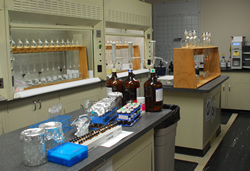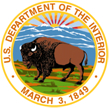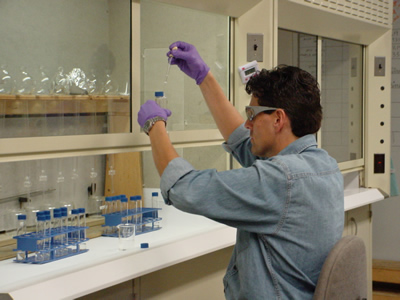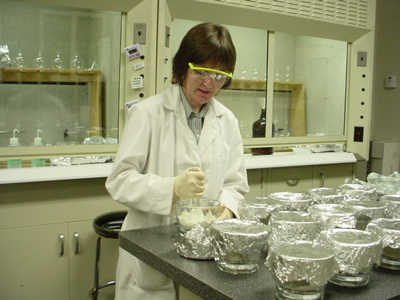TDI-Brooks International Awarded Third Consecutive Five-Year US Fish and Wildlife Service (USFWS) Contract
TDI-Brooks International was awarded a third, consecutive five-year U.S. Fish and Wildlife Service (FWS) nationwide monitoring contract for trace organic analysis of soil, plant, animal, and water samples.
TDI-Brooks International , through its affiliated analytical laboratory, B&B Laboratories, has been awarded by the US Fish and Wildlife Service a national, multi-year contract for determination of pesticide, PCB, and petroleum contaminants on a wide range of soil, plants, animals, and waters. This is a competitive renewal of a five year contract originally awarded to TDI-Brooks/B&B Laboratories in 2002. This award is the third consecutive five year contract awarded to the lab. This contract is worth about $5 million in laboratory analyses over the next five years.
Introduction 
Every five years Analytical Control Facility (ACF) renews its organic contracts. To do so, ACF sends out a Request for Proposal (RFP). The RFP dictates the services required by ACF and allows prospective labs to submit their proposal for an organic contact. The information below details the requirements and work that must be performed by the organic lab to be granted a contract.
Background
 As the Nation's principal conservation agency, the Department of the Interior has responsibility for most of our nationally owned public lands and natural resources. This includes protecting our fish and wildlife, preserving the environmental and cultural values of our nation's parks and historical places, and providing for the enjoyment of life through outdoor recreation.
As the Nation's principal conservation agency, the Department of the Interior has responsibility for most of our nationally owned public lands and natural resources. This includes protecting our fish and wildlife, preserving the environmental and cultural values of our nation's parks and historical places, and providing for the enjoyment of life through outdoor recreation.
The primary goal of the U.S. Fish and Wildlife Service, a Bureau of the  Department of the Interior, is the conservation and sound management of sport fishery and wildlife resources for the benefit of present and future generations of Americans. Attainment of this goal requires continual collection, analysis and synthesis of new information on which wise and timely management decisions can be based. As a part of this decision making process, the Service has the responsibility of determining the effects of environmental contaminants on organisms and their habitats. A significant part of this responsibility requires the determination of trace amounts of organic compounds in the tissues of fish, wildlife, invertebrates and plants, as well as in water and soil/sediments.
Department of the Interior, is the conservation and sound management of sport fishery and wildlife resources for the benefit of present and future generations of Americans. Attainment of this goal requires continual collection, analysis and synthesis of new information on which wise and timely management decisions can be based. As a part of this decision making process, the Service has the responsibility of determining the effects of environmental contaminants on organisms and their habitats. A significant part of this responsibility requires the determination of trace amounts of organic compounds in the tissues of fish, wildlife, invertebrates and plants, as well as in water and soil/sediments.
Studies conducted by the Service cover a wide spectrum of contaminant problems and geographic areas. These include studies involving organic compounds derived from agriculture, energy development, and industrial activities. Because of the diversity of studies and the unique requirements of individual studies, "batches" of samples submitted for analyses may vary considerably.
 The Service seeks contractors to perform organochlorine pesticides and PCB analyses, and other organic analyses, in plant and animal tissues, water, and soil/sediment. The U.S. Fish and Wildlife Service currently has contracts with several laboratories to provide chemical analyses for over sixty contaminants in animal tissues and environmental samples. The Analytical Control Facility has the responsibility for assessing and assuring the quality of these chemical analyses.
The Service seeks contractors to perform organochlorine pesticides and PCB analyses, and other organic analyses, in plant and animal tissues, water, and soil/sediment. The U.S. Fish and Wildlife Service currently has contracts with several laboratories to provide chemical analyses for over sixty contaminants in animal tissues and environmental samples. The Analytical Control Facility has the responsibility for assessing and assuring the quality of these chemical analyses.
The quality of contracted chemical analyses is assured by contracting with laboratories that have demonstrated their competence in performing the analyses and by monitoring their performance throughout the life of the contact.
Contract Award Process
The process of awarding a FWS analytical contract is very long and complicated, involving the coordinated efforts of scientists, administrators, and contracting specialists. Throughout the process the primary goal is to select laboratories capable of performing quality chemical analyses. A laboratory is evaluated by a committee of FWS chemists and is judged technically competent to perform the specific analyses requested if it passes two levels of evaluation. In the first level, the precision and accuracy of the laboratory's analyses of test samples provided by the FWS are compared with the precision and accuracy that would be expected for the particular analytes. The committee establishes a minimum acceptable score based primarily on the technical judgement of the members. Only those laboratories that pass the first level of evaluation are considered in the second.
In the second level of evaluation the committee considers a number of criteria relating to  the quality of the laboratory, its procedures, its facilities, its experience, and its personnel. Each evaluator scores each criterion based on the information provided by the laboratory. The committee establishes a minimum acceptable score based primarily on the technical judgement of the members. Those laboratories that pass both levels of evaluation are inspected by the representatives of the evaluation committee and the contracting and general services office. The purpose of the inspections is to confirm that the facilities, equipment, and personnel that were described in the proposal actually exist, and to observe the functioning of the laboratory. After a successful site visit the laboratory is considered technically competent.
the quality of the laboratory, its procedures, its facilities, its experience, and its personnel. Each evaluator scores each criterion based on the information provided by the laboratory. The committee establishes a minimum acceptable score based primarily on the technical judgement of the members. Those laboratories that pass both levels of evaluation are inspected by the representatives of the evaluation committee and the contracting and general services office. The purpose of the inspections is to confirm that the facilities, equipment, and personnel that were described in the proposal actually exist, and to observe the functioning of the laboratory. After a successful site visit the laboratory is considered technically competent.
Below is an example of the contract award process and the number of laboratories typically involved in each step.
FWS Contracting Process |
Number of labs that respond |
Announce the RFP |
|
Number of Laboratories that Request the RFP |
300 |
Number of Labs that Request the Check Samples |
20 |
Number of Labs that Return the Check Sample Analyses |
8 |
Number of Labs that Pass the Check Sample QA/QC |
4 |
Number of Labs that Pass Level II Evaluation |
4 |
Number of Labs that Pass Inspection |
4 |
Number of Labs Awarded Contracts |
3 |
The precision and accuracy of the analyses performed by the contract laboratories are monitored over the life of the contract thought a variety of quality assurance procedures. Some are specific to each catalog that is analyzed, others are designed to test the laboratory operation in general.
